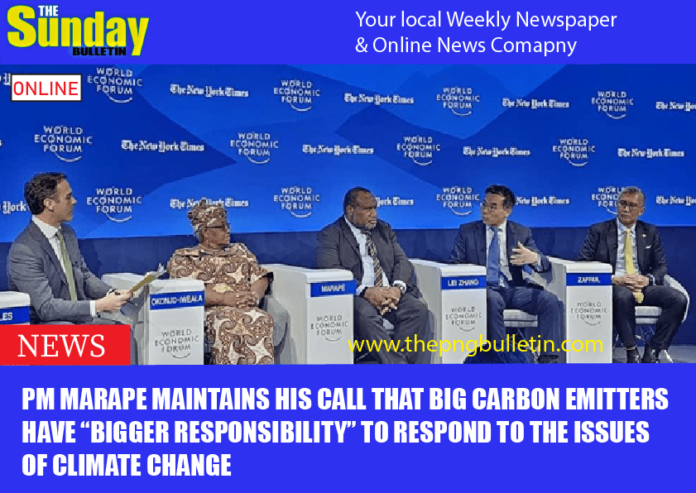PRIME Minister Hon. James Marape has reiterated his consistent call that big carbon emitters of the world have a “moral obligation and the bigger responsibility” to manage the current climate crisis ahead of every other country.
The Prime Minister said this in his response to President Donald Trump’s with
drawal of the United States from the Paris Agreement.
Prime Minister Marape was answering a question posed by New York Times
journalist David Gelles to him in a panel at the World Economic Forum (WEF)
Annual Meeting in Davos this week.

Mr Gelles had asked the Prime Minister for his reaction to the withdrawal in light of Papua New Guinea’s position as a world leader in biodiversity, tropical rainforests, and – together with the rest of the Pacific countries – ocean space as marine resource and carbon sink holder.
PM Marape was part of a four-person panel hosted by WEF on Wednesday (22.01.25) in collaboration with the New York Times company. The panel led the discussion on finding ways of balancing the impact from the rise in global trade, and management of climate goals.
Panelists besides PM Marape were Minister of Investment, Trade and Industry of Malaysia, Mr. Tengku Zafrul Aziz; CEO of Envision Energy, Mr. Zhang Lei; and Director-General of the World Trade Organisation, Dr. Ngozi Okonjo-Iweala.
Halfway into the lively session during which PM Marape spoke for a better collaboration in environmental management globally, Mr Gelles asked the Prime Minister, “I would like you to address the United States withdrawal from the Paris Agreement. As you have stated, we all need to preserve the world as best we can, but here we have one of the largest economies in the world pulling back on its commitment to Climate Change. What is the reception of this in a country like PNG?”
Prime Minister Marape replied, “While it is not my place to advise the government of America, it is prudent that the biggest holder of carbon footprint takes the greater responsibility (because) much of the burden is being borne by those of us with the least carbon footprint.
“There is a moral responsibility by each global leader to think from the global perspective instead of from their own national-interest perspective.
“Evidence shows that we are at a tipping point, almost reaching the end of
earth’s sustainability level. If this planet sinks, we all sink with it. There is no sec
ond Earth,” he said.
When the discussion moved to sustainable management of resources, Prime Minister Marape highlighted Papua New Guinea’s vast potential in clean energy, forestry and marine resource.
He said, “(PNG) has a lot of clean energy alternates. PNG is right in the middle of the Asian century that is coming up and we look forward to contributing to forest resource management, clean energy alternates, and managing our ocean and seas.
“The ocean is 70 percent of the planet. There you find food, you find resource, you find carbon sink; our forest is a big carbon sink.
“I want to appeal to those out there who want to help; save the planet, PNG
is a great alternate for you to see,” he said.
Prime Minister Marape also called for more collaborative efforts among global leadership to overcome obstacles that impede Foreign Direct Investments and trade goals in each country, especially in developing countries, because of the position public policy takes in dictating private sector participation.

